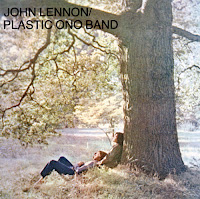Looking back on this blog series, I probably should have started differently, since Ringo's Sentimental Journey album was the first release post-Beatles of any of the four members. Nobody outside of The Beatles' team knew that though, since the general public wouldn't know until McCartney's album was issued exactly three weeks later to the day, which included the now famous press release fake interview sheet that explained about the split of The Beatles.
When I originally started this blog series though, I wasn't sure what I would be doing completely. I had discussed McCartney's debut album in my other blog as a subject and some people felt that I was giving it too little for it to be in just one basic blog. I ended up agreeing after much thought and so set about doing the blog that you now see before you.
The last album that The Beatles had recorded together was Abbey Road, which they had finished work on during the summer of 1969 I think. They had already decided that The Beatles would be no more, but hadn't officially announced it.
The now ex-Beatles were doing their own thing. George was apparently holidaying and touring as a guest musician for Delaney & Bonnie Bramlett, Paul was going through a period of depression and recording at home (the fruits of which are too be seen in a few years time officially actually, since the release of multiple volumes of what are called The Rude Sessions have been announced - the name given to his home studio in Scotland), and John was doing the political statements such as the bed-in's and that, whilst recording what are now known as classic solo singles in the way of Give Peace A Chance, Cold Turkey, etc. He would not release his first post-Beatles album until December of 1970.

Surprisingly, Ringo actually issued two albums in 1970. Sentimental Journey in March was a set made up of standards such as the title track, Night And Day, and Whispering Grass. His second release, Beaucoups of Blues, was a set of Country & Western songs that was released in September, with all of the songs written for him specially and recorded using the cream of Country musicians such as Jerry Reed and Pete Drake in Nashville.
Looking back on it, I can see that John's use of profanity on the album wasn't all that surprising, because he is after all heard using language in the background on Hey Jude, which if recorded now would have easily have been edited out, possibly even back then? Back then though it would have surprised people, and it certainly did when I first heard the album. I didn't hear it until the late eighties if truth be told, but it made an impact.
 Paul's first album, as discussed, was a mixed bag of styles, experiments, song fragments (a piece of the unreleased song Suicide tagged on to Hot As Sun/Glasses for instance), and all sorts, recorded in a very lo-fi way to be honest. The one ex-Beatle that everyone thought would have the most produced and arranged sound. Something that did come as a shock to people. It would take time for McCartney to become comfortable again with music.
Paul's first album, as discussed, was a mixed bag of styles, experiments, song fragments (a piece of the unreleased song Suicide tagged on to Hot As Sun/Glasses for instance), and all sorts, recorded in a very lo-fi way to be honest. The one ex-Beatle that everyone thought would have the most produced and arranged sound. Something that did come as a shock to people. It would take time for McCartney to become comfortable again with music.So, during 1970 every single ex-Beatle issued an album at least. A full year for me to look at then, albeit with the get-out clause that none of the ex-Beatles actually wrote anything on either of Ringo's first two albums that came out in 1970, so I'll take that as a bit of relaxation.
Now, time to get on with the next part then.
Links (Amazon) -
1. Ringo Starr - Sentimental Journey (UK/US)
2. Paul McCartney - McCartney UK - MP3/CD
3. Paul McCartney - McCartney US - MP3/CD
4. Ringo Starr - Beaucoups of Blues (UK/US)
5. George Harrison - All Things Must Pass (UK/US)
6. John Lennon - Plastic Ono Band (UK/US)





